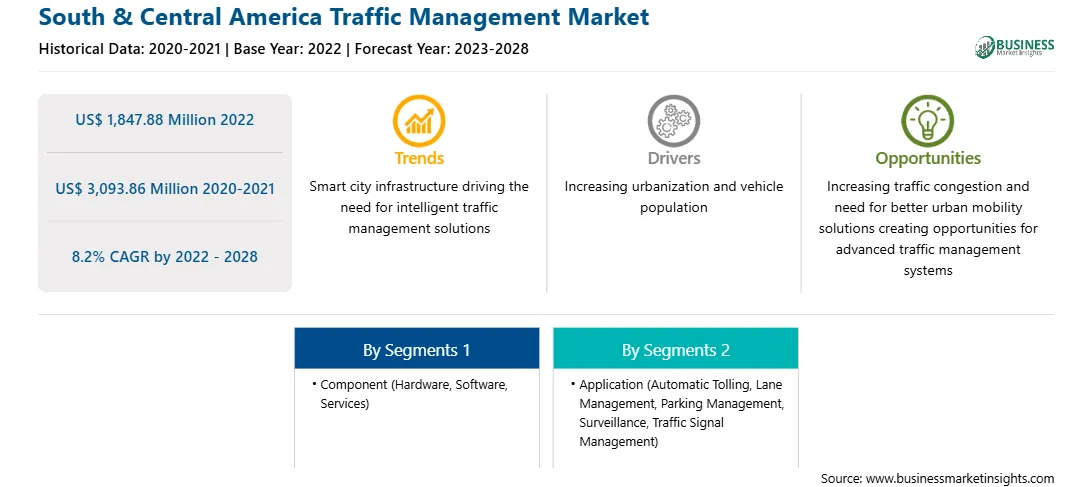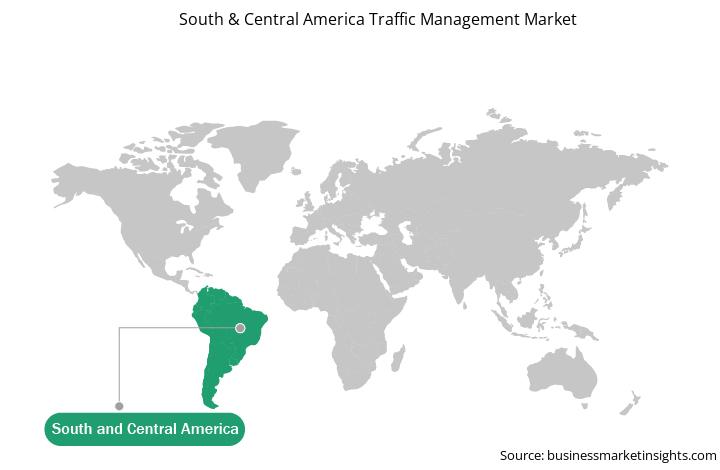South & Central America Traffic Management Market
No. of Pages: 126 | Report Code: BMIRE00026323 | Category: Technology, Media and Telecommunications
No. of Pages: 126 | Report Code: BMIRE00026323 | Category: Technology, Media and Telecommunications
In most developing nations, the migration of people from rural to urban areas is increasing at a steady pace. Such a growing urban population puts increased stress on the roadways. Several other factors are also directly linked with rising congestion in urban areas, which leads to an increased requirement for better traffic management systems. At first, the rising urban population increases the number of vehicles on the road, leading to congestion. While the number of private vehicles nearly doubled during that period. Second, ride-hailing services from cab aggregators, such as Uber, Grab, Ola, and Lyft, have rapidly increased. Such services have been substituting mass transit systems, leading to a surge in vehicles on the road. Third, growing urbanization positively impacted the growth of e-commerce and on-demand platforms.
Delivery vehicles, including two-wheelers, witnessed rapid demand due to such growth in internet-based purchases since e-commerce deliveries include movement between warehouses, missed deliveries, and returns, among other trips. Lastly, the relatively low effectiveness of specific policies leads to a further buildup of congestion. For example, banning roadside parking without an alternative parking area can confuse traffic buildup.
Similarly, investment in creating separate lanes for buses and high occupancy vehicles (HOV) can increase congestion if not planned well. These lanes are often created to smoothen public transit systems and reduce the dependency on private vehicles. However, several densely populated cities are quite old and hence not developed in a planned manner. Thus, due to operational issues and challenges in implementing such projects, congestion gets exacerbated instead of reduced. All the factors mentioned above are driving the traffic management market.
With a robust traffic management system comprising software, sensors, cameras, and display boards, congestion can be effectively reduced. These systems can be installed on an existing road without the requirements of infrastructural modification and thus can significantly aid in reducing congestion. Parking management systems can provide information to the driver regarding space availability and reduce confusion and congestion arising from the same. Similarly, a lane management system can effectively manage traffic flow by opening or closing lanes, depending on the traffic rate at each point in time. Considering the advantages of traffic management systems, the fast urbanization rate is expected to boost the traffic management market over the next few years.
With new features and technologies, vendors can attract new customers and expand their footprints in emerging markets. This factor is likely to drive the South & Central America traffic management market at a substantial CAGR during the forecast period.
The South & Central America traffic management market is segmented by component, application, and country. Based on component, the market is segmented into hardware, software, and services. In 2022, the hardware segment held a larger market share. On the other hand, the software superconductors segment is expected to register a higher CAGR during the forecast period.
Based on hardware, the market is segmented into camera, display boards, and sensors. In 2022, the camera segment held a larger market share. On the other hand, the sensors segment is expected to register a higher CAGR during the forecast period.
Based on software, the market is segmented into cloud and on-premise. In 2022, the on-premise segment held a larger market share. On the other hand, the cloud is expected to register a higher CAGR during the forecast period.
Based on application, the market is segmented into automatic tolling, lane management, parking management, surveillance, traffic signal management, and others. The traffic signal management segment held the largest share in 2022. The surveillance segment is expected to register the highest CAGR in the market during the forecast period.
Based on country, the market is segmented into Brazil, Argentina, and the Rest of SAM. In 2022, Brazil held a larger market share. On the other side, and it is also expected to register a higher CAGR during the forecast period.
AXIS COMMUNICATIONS AB; Cisco Systems, Inc.; Dahua Technology Co., Ltd.; IBM Corporation; Hangzhou Hikvision Digital Technology Co., Ltd.; SGS SA; Siemens AG; Teledyne FLIR LLC; Cubic Corporation; and SNC-Lavalin Group are the leading companies in the South & Central America traffic management market.
Strategic insights for the South & Central America Traffic Management provides data-driven analysis of the industry landscape, including current trends, key players, and regional nuances. These insights offer actionable recommendations, enabling readers to differentiate themselves from competitors by identifying untapped segments or developing unique value propositions. Leveraging data analytics, these insights help industry players anticipate the market shifts, whether investors, manufacturers, or other stakeholders. A future-oriented perspective is essential, helping stakeholders anticipate market shifts and position themselves for long-term success in this dynamic region. Ultimately, effective strategic insights empower readers to make informed decisions that drive profitability and achieve their business objectives within the market.

| Report Attribute | Details |
|---|---|
| Market size in 2022 | US$ 1,847.88 Million |
| Market Size by 2028 | US$ 3,093.86 Million |
| Global CAGR (2022 - 2028) | 8.2% |
| Historical Data | 2020-2021 |
| Forecast period | 2023-2028 |
| Segments Covered |
By Component
|
| Regions and Countries Covered | South and Central America
|
| Market leaders and key company profiles |
The geographic scope of the South & Central America Traffic Management refers to the specific areas in which a business operates and competes. Understanding local distinctions, such as diverse consumer preferences (e.g., demand for specific plug types or battery backup durations), varying economic conditions, and regulatory environments, is crucial for tailoring strategies to specific markets. Businesses can expand their reach by identifying underserved areas or adapting their offerings to meet local demands. A clear market focus allows for more effective resource allocation, targeted marketing campaigns, and better positioning against local competitors, ultimately driving growth in those targeted areas.

The South & Central America Traffic Management Market is valued at US$ 1,847.88 Million in 2022, it is projected to reach US$ 3,093.86 Million by 2028.
As per our report South & Central America Traffic Management Market, the market size is valued at US$ 1,847.88 Million in 2022, projecting it to reach US$ 3,093.86 Million by 2028. This translates to a CAGR of approximately 8.2% during the forecast period.
The South & Central America Traffic Management Market report typically cover these key segments-
The historic period, base year, and forecast period can vary slightly depending on the specific market research report. However, for the South & Central America Traffic Management Market report:
The South & Central America Traffic Management Market is populated by several key players, each contributing to its growth and innovation. Some of the major players include:
The South & Central America Traffic Management Market report is valuable for diverse stakeholders, including:
Essentially, anyone involved in or considering involvement in the South & Central America Traffic Management Market value chain can benefit from the information contained in a comprehensive market report.